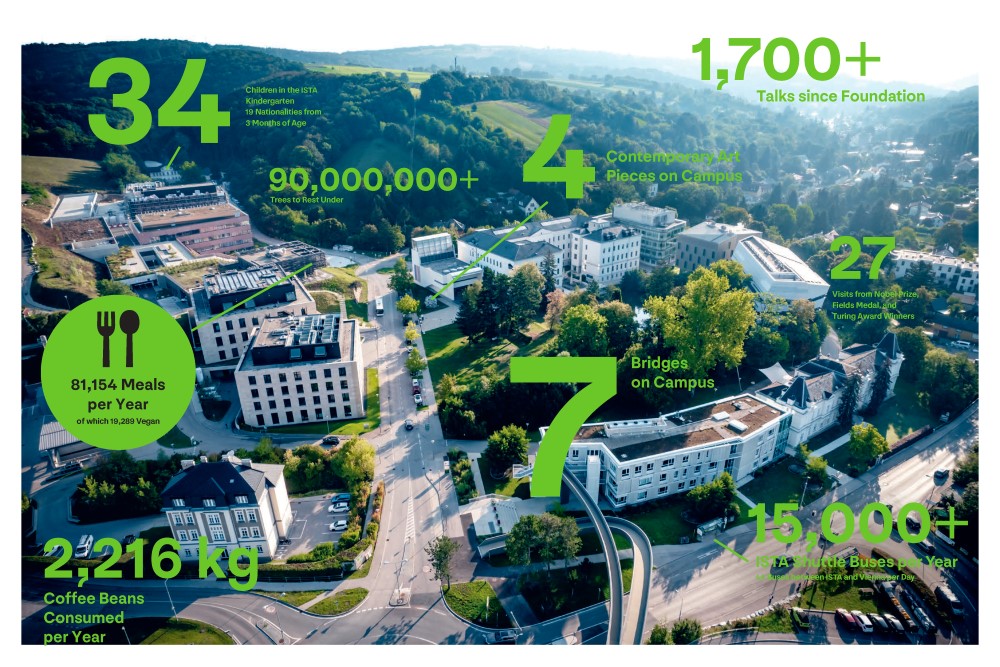At a Glance
ISTA is a PhD-granting research institution dedicated to cutting-edge research.
The Institute of Science and Technology Austria (ISTA) in Klosterneuburg on the outskirts of Vienna is a PhD-granting research institute. Opened in 2009, the Institute focuses on basic research in the natural sciences, mathematics, and computer science. ISTA employs professors according to a tenure-track model as well as postdocs, and PhD students in an international graduate school. In addition to its commitment to basic research, which is solely curiosity-driven, the Institute holds the rights to all resulting discoveries and promotes their exploitation.
ISTA currently has over 80 research groups conducting basic research in the fields of mathematics, computer science, physics, chemistry, neuroscience, biology, earth sciences and astrophysics. These groups cover both theoretical and experimental research. An essential factor for the Institute’s success is that traditional boundaries between disciplines are broken down and cooperation between groups is strongly encouraged. By 2026, up to 90 research groups will work in ISTA’s international environment with state-of-the-art infrastructure. The Institute expects to reach its full capacity of 150 research groups by 2036.

The founding principles of ISTA remain valid today and continue to guide the growth and development of the Institute in its second decade, as it works toward excelling in its core missions:
ISTA was established in 2006 by the Federal Government of Austria and the Government of Lower Austria. The campus opened in 2009 in the city of Klosterneuburg, on the outskirts of Vienna. The Institute was founded based on a set of principles that were first formulated by Haim Harari, Olaf Kübler, and Hubert Markl, who distilled them from the most successful systems and ideas in the world for the governance of research institutes.
Curiosity-driven basic research
Scientists pursue their interests without constraints or predefined research topics, supported by state-of-the-art infrastructure.
Independent boards of scientists
More than half of the trustees who oversee the Institute are international scientists. Guidance is also provided by an international scientific advisory board.
International
ISTA brings together scientists and staff from all over the world. Employees use English as their working language.
Interdisciplinary
ISTA brings together researchers from all major scientific disciplines. Communication and collaboration are encouraged across scientific fields.
PhD granting Graduate School
The Graduate School offers an interdisciplinary PhD program that supports students in becoming experts in their fields while fostering communication and collaboration across research groups and disciplines.
Supporting careers
Professors are hired early in their careers on a tenure track system, providing them with independence and a career perspective.
Exploiting results
Globally competitive basic research leads to unforeseen but useful and valuable discoveries; intellectual property and technology transfer are important objectives.
Diverse funding
ISTA is publicly and privately financed. Scientists acquire third-party funds; donations to the Institute and revenues from intellectual property are transferred to an endowment fund.
ISTA strives for excellence in research as well as for professionalism in every dimension, including scientific, personal, and financial conduct. The expectations are summarized in our Code of Conduct, which highlights the values of the Institute and outlines standards that we, in our role as ISTA employees, use as the basis for our daily and long‐term interactions, actions, and decisions.
Campus opening: 37 employees,
Thomas A. Henzinger appointed
as first President
First PhD students join ISTA
First PhD students graduate from ISTA
1,000 employees, among them
76 professors and 320 students
Martin Hetzer becomes the
second President of ISTA
Planned opening of the
VISTA Science Experience Center
Around 150 professors,
approx. 2,000 employees
Read more about the Institute’s history here.
